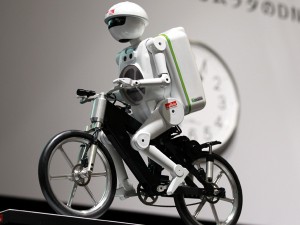Asia’s biggest tech fair opens in Japan
CHIBA—Smartphones detecting bad breath and radiation, twistable remote controls and a super-thin tablet computer were just some of the gadgets on show at Asia’s biggest tech fair in Japan Tuesday.
Around 600 firms unveiled their innovations at the Combined Exhibition of Advanced Technologies (Ceatec) technology exhibition in Chiba, near Tokyo, which is expected to draw 200,000 visitors during its five-day run, organizers said.
Japan’s Toshiba showcased what it calls “the world’s thinnest and lightest” tablet computer, equipped with a 10.1-inch display that is just 7.7 millimetres (0.3-inch) thick and weighs 558 grams (19.5 ounces).
Electronics parts maker Murata Manufacturing unveiled devices using a newly developed transparent organic film that can deliver instructions via twisting motions or pressure.
One of its gadgets, a light-powered plate called the Leaf Grip Remote Controller, has no buttons but is instead operated by the user bending and twisting it.
Another application of the film is as a touch panel that responds to left-right and up-down finger swipes but also senses how strongly it is being pressed, unlike conventional touchscreen glass used on smartphones.
“Currently we give commands two-dimensionally on touch panels in smartphones and tablet computers but this invention would give us another dimension – how hard they are pressed,” Murata spokesman Kazuhisa Mashita said.
“This could enable users to scroll screens slowly by touching the screen lightly and move images faster by pressing it harder,” he told AFP ahead of the exhibition.
Japanese telecom giant NTT DoCoMo showed off a smartphone with changeable sensor-embedded shells that can measure bad breath, vital body signs and even earphones that can be used to measure background radiation levels.
DoCoMo also demonstrated how population data can be obtained from mobile phone base stations, allowing urban planners to map population movements or identify the gender and age of people gathering in specific areas.
State-of-the-art radiation counters were on display along with power-saving technologies, with both in high demand after Japan’s March 11 disasters sparked fears over contamination and drives to cut power consumption over the summer.
The Fukushima crisis, triggered by the earthquake and tsunami, has led to around 80 percent of Japan’s reactors being taken off-line amid growing anti-nuclear sentiment in the archipelago nation.
Meanwhile, car accessories firm Pioneer displayed an in-car navigation system that projects data directly on to the windscreen instead of relying on a dashboard display.
Japan’s Nissan showed off its Vehicle to Home system that enables energy stored in an electric vehicle’s batteries to be used in homes, while microchip maker Rohm showcased what it hails as the world’s tiniest resistors – so small that 500,000 of them can be used in an hourglass instead of sand.
The Japanese firm also revealed efforts to diversify into the healthcare business, with “Technojewel” accessories such as earrings that can take the wearer’s pulse.
Sony’s displays include binoculars capable of high-quality digital recording in 2D and 3D, aimed at animal watchers, storm chasers and sports fans.
